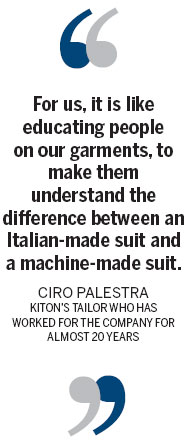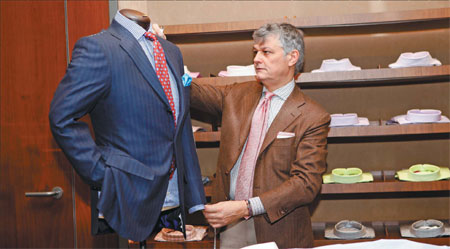In the most suitable taste
Updated: 2013-04-12 08:26
By Yao Jing (China Daily)
|
|||||||||||
|
Ciro Palestra, who has been working for Kiton for almost 20 years, has made tailor-made suits for nearly 30 Chinese VIP customers. Provided to China Daily |
Among makers of the world's most expensive suits, kiton has found a way to button up the Chinese market
It's a fitting story - although Kiton, master makers of men's suits, has the measure of China in doing business, it still finds it a challenge to match customers' tastes.
When you can pay between $13,000 (10,060 euros) and $56,000 for a made-to-measure suit, you would expect the buyer would be able to dictate whatever style he wants. But the Italian company prides itself on tradition, quality and exclusivity as standards of product.
It takes 250 hours to make one suit. A shirt takes 35 hours. The production mode has not changed since the birth of the brand 50 years ago in Naples.
"People in Europe have been wearing suits for hundreds of years, but in China, they prefer casual wear, such as T-shirts - even the wealthy," says Ciro Palestra, one of Kiton's tailors who flies to China twice a year to do personal fittings.
"For us, it is like educating people on our garments, to make them understand the difference between an Italian-made suit and a machine-made suit."

He says, for instance, that jackets in Europe are shorter in length, and in the sleeves, but Chinese customers always want longer in both.
"They prefer wearing one size bigger than the exact size," Palestra claims. "But we are pushing our buyers to follow our rules, not change the brand to a Chinese style. We want them to understand us and accept us."
Since Kiton opened its first store in China seven years ago - in the lobby of the China World Hotel Beijing in the World Trade Center complex - they have been increasingly accepted. Six more stores followed in Shanghai, Beijing, Chengdu and Xi'an.
"We open a new store on condition that the current stores are doing well," says He Bin, chief marketing director of Kiton China. "The next one will be located in Beijing's Charter Shopping Center this year."
Kiton China says its business is growing on average 20 percent a year. In 2012, its turnover reached around 100 million yuan ($16.1 million; 12.3 million euros), making China its fourth-largest market, after the United States, Italy and Russia.
"We now sell up to 5,000 suits a year," says He Bin."Although Chinese customers have to wait for two months to get a suit, where the measurement is taken in China and the suit made in Italy, they cherish the traditional tailoring and the careful procedure of each step that contributes to the comfort and fitness."
Chinese men, it seems, now value that excellence more than those in any other country - and can afford it more.
Using merino wool, the company makes up to 30,000 suits a year. In the global market, its ready-to-wear range accounts for 60 percent of total orders, but in China, more than 80 percent of orders are for tailor-made suits.
In Kiton's Shin Kong Place store in Beijing, about 20 styles of ready-to-wear suits in black, chocolate gray, blue and other conventional colors are available. Kiton provides 150 new fabric styles each season, with up to 40 suits from each.
"Compared with the bold colors in catalogues used for tailor-made suits and shirts, we are more conventional in choosing ready-to-wear products as Chinese men prefer deep colors," He says.
As the price difference between a ready-to-wear suit and a bespoke one is only around 10 percent, Chinese customers tend to pay extra to get something specially made for them.
Over the past eight years, Kiton China has suited up about 5,000 customers. Most are entrepreneurs aged 30 to 50.
He Bin says there is no direct competitor in master tailoring in the marketplace, but he is not seeking to compete for the mass market like many other top labels in men's fashion.
"Our customers are limited. They should appreciate personalized customization and be able to afford it," he says.
"Rather our target is making the bespoke service a regular one, and not like today, just doing it biannually. Sometimes when our tailors come to China, some customers cannot spare the time."
Kiton's tailors came to China last month to measure up customers for the spring and summer orders. Palestra, who has been with Kiton for almost 20 years, provided a fitting for nearly 30 Chinese VIP customers.
"I have been to China about 15 times since 2010, and I have worked for 150 clients here," he says.
Palestra is one of 360 tailors in the Naples factory, all experienced local people who have inherited the traditional Neapolitan technique.
After China, he will travel to Turkey and the Philippines to fit customers.
Palestra says his son is studying in the tailoring school at Kiton's factory in Arzano, an industrial suburb of Naples, where the only "machines" used are needles, thimbles and scissors.
"I will work for the company for a very long time because I love the working environment," he says. "We always pay attention to quality and we are like a family."
Kiton was co-founded in 1956 in Naples, Italy by Ciro Paone and Antonio Carola. The company takes its name from chiton, the Greek word for tunic.
yaojing@chinadaily.com.cn
(China Daily 04/12/2013 page20)
Today's Top News
List of approved GM food clarified
ID checks for express deliveries in Guangdong
Govt to expand elderly care
University asks freshmen to sign suicide disclaimer
Tibet gears up for new climbing season
Media asked to promote Sino-Indian ties
Shots fired at Washington Navy Yard
Minimum growth rate set at 7%
Hot Topics
Lunar probe , China growth forecasts, Emission rules get tougher, China seen through 'colored lens', International board,
Editor's Picks

|

|

|

|

|

|






